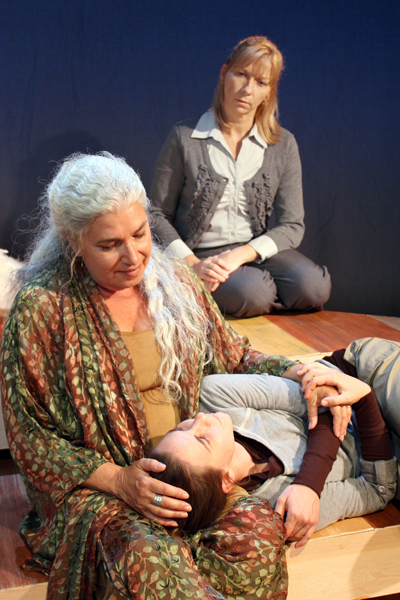
By Carol Davis

SAN DIEGO –Playwright Lee Blessing (A Walk in the Woods, Two Rooms, Cobb) wrote Eleemosynary in 1985. Funny thing about family dramas, relationships and intergenerational forces, they never seem dated. Drop my family into the Westbrook family: Dorothea (Rhona Gold), Artie (Julie Anderson Sachs) and Echo (Rachael Van Wormer), change the names to protect the innocent, multiply Echo by three, tweak the grandmother a bit (let’s just say highly opinionated and domineering) and you’ve got situations, attitudes and emotions that could run chapter and verse parallel to their lives.
Blessing was nominated for both the Tony award and Pulitzer Prize for A Walk in the Woods (seen at the La Jolla Playhouse in the late 80’s) and won a 1997 Los Angeles Drama Critics Circle Award for Best Writing for Eleemosynary. I recall seeing the play many years ago and never forgot the title Eleemosynary because it has such a poetic ring to it and I had never heard the word before. It’s no wonder Echo cherished the word, but for different reasons.
You see Echo the sixteen-year-old daughter of Artie and granddaughter of Dorothea is caught in the middle of both their worlds. We learn that she won her spelling bee with just that word and she loves it. Eleemosynary; “of or pertaining to alms; charitable.”
In her mind, if she could just win and be the spelling bee champion, she might be able to bring her mother and grandmother closer or at least talking to each other. Life however is more complicated than just winning a spelling bee, as Echo would soon find out.
All three women are independent, strong willed and somewhat eccentric. As the play opens Dorothea has suffered a stroke and granddaughter Echo is taking care of her–a role reversal because Artie, Echo’s mother, had left Echo in Dorothea’s care.
Dorothea taught her among other things the love of words and not just the English word. From the age of three months, she was preening her in Greek and Latin among other languages. In the meantime absentee mother Artee begins holding phone conversations with her daughter about (of all things) spelling words.
Told in both real time and flashbacks we get a chance to see the relationships between Dorothea and Artie, Artie and Echo and Dorothea and Echo. When we first meet them, Dorothea is testing her theory that humans can fly with Artie donning a pair of homemade wings hooked over her shoulders. She tries to convince Artie to jump off the top of a steep hill with leaves piled on the bottom to break the fall. Artie asks her if she’s nuts!
Well Dorothea believed that anyone could fly with the proper wings. “I wish I could be flying myself, but arthritis has made that impossible”. She did manage to get some of it on film.
In a series of vignettes (the play is about 90 min long) we learn that the three Westbrook women are special, remarkable, eccentric. They are all bright, slightly bizarre and at odds with the norm. But Eleemosynary is not so much about the oddities as it is about examining relationships and connections, charity and love. However… they all do suffer from some form of dysfunction.
As Dorothea, the New Age spiritualist, dressed in a flowing and loose caftan (Jennifer Mash), who uses her eccentricities to allow her the freedom to do as she pleases, Rhona Gold is at her best and so believable. In scene after scene her odd behavior seems so normal, I started to question my own sensibilities.
Julie Anderson Sachs’ Artie is the toughest role to pull off. As a mother who abandons her only daughter for whatever reasons, there is always a question mark. The line she walks is even more difficult than say, flying off a steep hill.
We are told when and can even sympathize with the how of her being under the wings of an oddball mother, whose domineering personality makes you cringe that she did what she did. But her reasons as to why she left her daughter (abandonment and loss of control) to be brought up by her grandmother are not easy to swallow. By play’s end though, director Chelsea Whitmore skillfully manages Artie’s character to be somewhat sympathetic and forgiving.
Rachael Van Wormer’s Echo, (who has played the role so often in other plays bearing other names) is the real conduit between her grandmother and her mother. While longing for her own connection to her mother and being so wonderfully allied with her grandmother, “My grandmother had a stroke, she can’t really talk. At least I think I can I can hear her though”, she shows a maturity beyond her sixteen years. She too walks a fine line bringing out the pathos of a child who wants it all to be all right with the aloofness of an adult whose core is in need of repair.
Van Wormer is both strong and compassionate while showing a combative almost vicious side when it comes to destroying her nearest competitor in the National Spelling bee. It works.
Lighting designer Karin Filijan illuminates space and time, Angelica Ynfante’s bare bones set of wooden platforms on different levels with stacks of books scattered around help define the play for what it is and Matt Lescault-Wood’s fine sound design brings Moxie’s sixth season in with a soft landing and room to spare. It’s a lovely play with a fine production to kick off a season.
See you at the theatre.
Dates: Sept. 4th– 26th
Organization: Moxie Theatre
Phone: 858-598-7620
Production Type: Comedy/Drama
Where: 6663 El Cajon Blvd. Ste. N San Diego, Ca 92115
Ticket Prices: $15.00-$25.00
Web: moxietheatre.com
Venue: The Rolando Theatre
*
Theatre critic Davis s based in San Diego